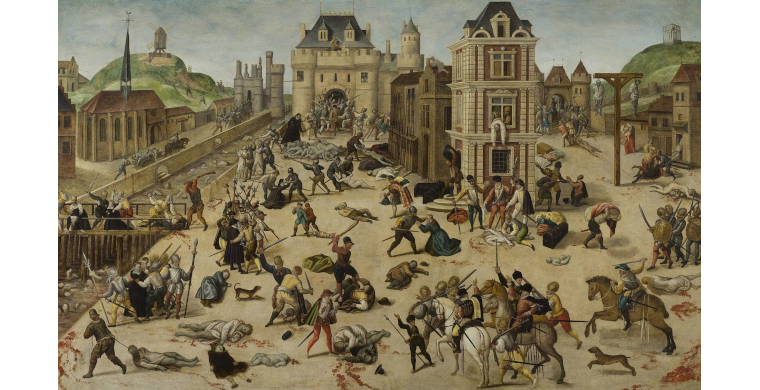HUGENOTS AND THE PROTESTANT EPISCOPAL CHURCH IN THE U.S.
By Chuck Collins
https://www.anglicanism.com
August 23, 2022
Huguenots were French Protestants who followed the teachings of John Calvin.
The 16th century Reformation quickly took hold in France and the Huguenot Church grew rapidly. At its first synod in 1559 fifteen churches were represented, and this grew to over one thousand churches at the synod in 1561.
Protestantism signified greater religious and political freedom which appealed to many French intellectuals and the professional classes, but the world was still Roman Catholic, France was still more than 90% Catholic, and the Catholic Church was determined to maintain its control. Leading up to St. Bartholomew's Day (beginning the evening of August 23, 1572), clashes between Protestants and Catholics worsened.
Thousands of prominent Huguenots were in Paris on the feast day of St. Bartholomew for a wedding between the Catholic king's daughter to a Protestant leader (Henry of Navarre, the future Henry IV of France) when soldiers and organized mobs were unleashed to brutally murder thousands of Protestants. This became known as the St. Bartholomew's Day Massacre.
In and around Paris in the weeks that followed between 5,000 and 30,000 (depending on who is telling the story) Huguenots were killed leading up to civil war. Historian Henry Chadwick wrote that this event "printed on Protestant minds the indelible conviction that Catholicism was a bloody and treacherous religion."
The French court tried to frame it as legitimate self-defense against a Huguenot plot, but few people believed it. Pope Gregory XIII had a medal struck in honor of the massacre which he sent around the world to all the Catholic prelates.
Three back-to-back religious wars between Catholics and Protestants followed the St. Bartholomew's Day Massacre.
This ended temporarily when King Henry IV issued the Edict of Nantes (1590) granting Protestants toleration and freedom to worship in their own way. However, after about one hundred years, on October 18, 1685, Louis XIV revoked the Edict of Nantes, and the heretical religion was again outlawed.
Huguenots were once again slaughtered on the streets of France and waves of persecuted Protestants left the country. It was not until November 28, 1787, after the United States of America had gained independence, that Marquis de Lafayette, recognizing that many of the American leaders were descendants of the Huguenots, persuaded Louis XVI to adopt the Edict of Toleration guaranteeing religious freedom in France.
Many early Americans were descendants of the Huguenots, included George Washington and Paul Revere.
Many Huguenots were assimilated into the Protestant Episcopal Church in the United States upon their arrival for various reasons, including a shared theological history in Calvinism.
END














